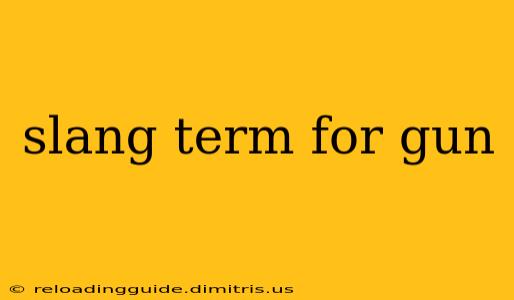Slang Terms for Guns: A Comprehensive Guide
The slang terms for guns are numerous and varied, reflecting regional dialects, subcultures, and the ever-evolving nature of language. Understanding these terms is crucial for anyone involved in law enforcement, journalism, or simply navigating popular culture. This guide delves into the diverse vocabulary surrounding firearms, exploring their origins and usage. We'll also touch on the ethical considerations of using such terminology.
Categorizing the Slang:
Slang terms for guns often fall into categories based on the type of firearm, its perceived function, or the cultural context in which it's used. This categorization helps us understand the nuances of each term and its implied meaning.
Based on Firearm Type:
-
Handguns: "Piece," "Glock" (often used generically, regardless of brand), "heat," "iron," "burner," "hand cannon." The term "piece" is a broad term referring to any firearm, but it's frequently associated with handguns. "Glock" has become almost a generic term for any semi-automatic pistol due to the brand's popularity.
-
Long Guns (Rifles and Shotguns): "Stick," "shooter," "rifle," "scattergun" (for shotguns), "long arm," "boom stick." These terms are often less specific than those for handguns, but the context usually provides clarity.
-
Specific Weapon Types: Many slang terms refer to specific firearm models or types, such as "Tommy gun" (Thompson submachine gun), "uzi," "AK" (AK-47), "AR" (AR-15), or even names referencing specific manufacturers.
Based on Perceived Function or Context:
-
Implying Danger or Illegality: "Heat," "iron," "burner" (suggesting a weapon used for illicit activities and quickly disposed of), "gat," "strap," "firepower." These terms often appear in crime dramas or gangster slang.
-
Neutral or Descriptive Terms: "Piece," "shooter," "weapon," "firearm" while technically not slang, are often used colloquially.
Regional Variations:
Slang terms vary significantly across different regions and communities. What might be common parlance in one area could be entirely unknown or even offensive in another. Therefore, understanding the context is paramount.
Ethical Considerations:
Using slang terms for guns requires careful consideration. While understanding the language is important, casually employing such terms can trivialize the seriousness of gun violence and its impact on society. In professional contexts, precise and formal terminology is often preferred to avoid ambiguity and maintain a respectful tone.
Conclusion:
The slang vocabulary surrounding guns is rich and multifaceted, reflecting the complex relationship society has with firearms. Understanding these terms is crucial for many, but it’s equally important to be mindful of the potential implications of their usage. By understanding both the context and the potential impact, we can use language responsibly and effectively. Further research into specific regional dialects and subcultures can provide a deeper understanding of these varied terms and their evolution over time.

